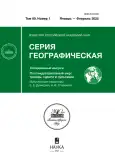Creative Energy: Portfolio Principle of Alexander Gorkin
- Authors: Pilyasov A.N.1
-
Affiliations:
- Lomonosov Moscow State University
- Issue: Vol 89, No 1 (2025): СПЕЦИАЛЬНЫЙ ВЫПУСК: ПОСТИНДУСТРИАЛЬНЫЙ МИР: ТРЕНДЫ, СДВИГИ И ПУЛЬСАЦИИ
- Pages: 30-48
- Section: Articles
- URL: https://journal-vniispk.ru/2587-5566/article/view/295113
- DOI: https://doi.org/10.31857/S2587556625010032
- EDN: https://elibrary.ru/CRFMNC
- ID: 295113
Cite item
Abstract
Alexander Pavlovich Gorkin’s professional life is an example of faithful service to geography on the one hand, and on the other hand, an example of an absolutely non-canonical scientist with very broad interests, diversified creative activities, which became the subject of the research. The subject of the study is the period of A.P. Gorkin’s professional activity, which lasted for almost 60 years from the 1960s to the 2010s. The research question of the article: where was the creative energy of A.P. Gorkin directed during his working life and what lessons should the new generation of Russian geographers learn from it? The identified research question determined three tasks to be solved: (1) to assess the forms of manifestation of scientific creativity of A.P. Gorkin in the methodology of the “portfolio approach” adopted in economics; (2) to identify cross-cutting features of Gorkin’s scientific creativity in all areas (publications, lectures, encyclopedias, etc.); (3) to determine the elements of Gorkin’s creative heritage. The information base of the work was taken from the intellectual system of case studies of scientometric data of Lomonosov Moscow State University (“ISTINA”). The novelty of the research lies in the systematic approach applied for the first time to the study of the scientific creativity of a talented scientist: not only the traditional publication activity, but also his educational, teaching and lecturing activities are considered as parts of the whole. Main results: (1) the “investment portfolio” of Gorkin’s creative energy calculated for the entire cycle of his professional life consists of 660 equivalent articles, including 300 equivalent articles as education of young personnel for economic geography, 220 as publication activity, 80 as teaching activity, 60 as lecture activity; (2) the thematic triad that runs through A.P. Gorkin’s publications, in the titles of his students’ dissertations, and in his lectures—theoretical and methodological problems of socioeconomic geography, geography of post-industrial industry, and social geography; (3) the most important lessons of A.P. Gorkin for us: the values of collectivism in science that he possessed; interest in the study of big, systemic phenomena and the art of posing major problems of the economic geography; topics for long-term research study—spatio-temporal patterns of modern economic activities; the role of industry and other sectors of national economy in the process of “densification” of the space-time continuum of socioeconomic development of mankind; measurement of mobility and inertia of location in socioeconomic geography.
Full Text
About the authors
A. N. Pilyasov
Lomonosov Moscow State University
Author for correspondence.
Email: pelyasov@mail.ru
Russian Federation, Moscow
References
- Alaev E.B. Sotsial’no-ekonomicheskaya geografiya. Ponyatiino-terminologicheskii slovar’ [Socioeconomic Geography. Conceptual and Terminological Dictionary]. Moscow: Mysl’ Publ., 1983. 350 p.
- Berg L.S. Vsesoyuznoe geograficheskoe obshchestvo za sto let: 1845–1945 [All-Union Geographical Society for a Hundred Years: 1845–1945]. Moscow, Leningrad: Izd-vo Akad. Nauk SSSR, 1946. 263 p.
- Bergson A. Tvorcheskaya evolyutsiya [Creative Evolution]. Moscow: AST Publ., 2023. 416 p.
- Gibson R. Formirovanie investitsionnogo portfelya. Upravlenie finansovymi riskami [Formation of an Investment Portfolio. Financial Risk Management]. Moscow: Alpina Publ., 2015. 276 p.
- Glaz’ev S.Yu. Teoriya dolgosrochnogo tekhniko-ekonomicheskogo razvitiya [Theory of Long-Term Technical and Economic Development]. Moscow: Vladar Publ., 1993. 311 p.
- Gorkin A.P. Geografiya postindustrial’noi promyshlennosti [Geography of Post-Industrial Industry]. Smolensk: Oikumena Publ., 2012. 348 p.
- Gumilev L.N. Etnogenez i biosfera Zemli [Ethnogenesis and Biosphere of the Earth]. Leningrad: Gidrometeoizdat, 1989. 526 p.
- Kapitsa P.L. Eksperiment, teoriya, praktika [Experiment, Theory, Practice]. Moscow: Nauka Publ., 1981. 496 p.
- Kondratiev N.D. Bol’shie tsikly kon’’yunktury [Large Cycles of Market Conditions]. Moscow: Yurait Publ., 2013. 478 p.
- Konstantin Konstantinovich Markov: Vospominaniya, ocherki, nauchnye stat’i [Konstantin Konstantinovich Markov: Memoirs, Essays, Scientific Articles]. Kaplin P.A., Ed. Moscow, Smolensk: Magenta Publ., 2005. 296 p.
- Peres K. Tekhnologicheskie revolyutsii i finansovyi kapital [Technological Revolutions and Financial Capital]. Moscow: Delo Publ., 2013. 231 p.
- Pilyasov A.N. A thinking person is the measure of everything (In memory of academician of the Russian Academy of Sciences A.G. Granberg). Reg. Issled., 2011a, no. 3, pp. 3–14. (In Russ.).
- Pilyasov A.N. Creative heritage of Yu.G. Saushkin and modernity. In Sotsial’no-ekonomicheskaya geografiya: istoriya, teoriya, metody, praktika [Socioeconomic Geography: History, Theory, Methods, Practice]. Katrovskii A.P., Ed. Smolensk: Universum Publ., 2011b, pp. 49–69. (In Russ.).
- Pilyasov A.N. The last encyclopedist of the Soviet economic geography. In Geograficheskoe polozhenie i territorial’nye struktury: pamyati I.M. Mayergoyza [Geographical Location and Territorial Structures: In Memory of I.M. Maergoiz]. Treyvish A.I., Ed. Moscow: Novyi Khronograf Publ., 2012, pp. 346–367.
- Pilyasov A.N. Non-equilateral triangle: Yu.G. Saushkin between L.S. Berg and N.N. Baransky. Reg. Issled., 2021, no. 3, pp. 14–27. (In Russ.).
- Sotsial’no-ekonomicheskaya geografiya: ponyatiya i terminy. Slovar’-spravochnik [Socioeconomic Geography: Concepts and Terms. Dictionary-Reference Book]. Gorkin A.P., Ed. Smolensk: Oikumena Publ., 2013. 328 p.
- Teilhard de Chardin P. The phenomenon of Man. Harper Perennial, 1976. 320 p.
- Vernadskii V.I. Khimicheskoe stroenie biosfery Zemli i ee okruzheniya [Chemical Structure of the Earth’s Biosphere and Its Environment]. Moscow: Nauka Publ., 1987. 348 p.
- Zabelin I.M. Puteshestvie v glub’ nauki: Akademik A.A. Grigor’ev. Vydayushchiisya geograf-teoretik. Odin iz osnovopolozhnikov sovremennoi geografii. Sozdatel’ Instituta geografii AN SSSR [Journey into the Depths of Science: Academician A.A. Grigor’ev. Outstanding Geographer and Theorist. One of the Founders of Modern Geography. Founder of the Institute of Geography of the USSR Academy of Sciences]. Moscow: URSS Publ., 2022. 80 p.
Supplementary files











